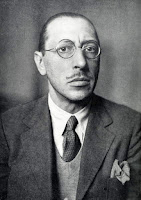 |
| Igor Stravinksy |
From the program book
Anatoly Lyadov is often mentioned in music histories, not primarily for his own beautifully crafted orchestral pieces like "The Enchanted Lake," but as the man who missed the opportunity to compose "The Firebird." This ballet, which Igor Stravinsky eventually wrote, became a cornerstone of his career and is frequently featured in programs, often following Lyadov's own works.
The common but unverified narrative is that Lyadov had been so slow to start the project that he had only just bought his manuscript paper when the first part of the score was due. This led Sergei Diaghilev, who was in charge of staging the ballet, to dismiss him. Lyadov had developed a reputation for laziness early in his career. He was known to skip classes at the Saint Petersburg Conservatory, earning the ire of his teacher, Rimsky-Korsakov, who called him "irresponsible." Even Sergei Prokofiev, who studied with Lyadov and held him in high regard, noted in his memoirs that Lyadov's "most remarkable feature" was his laziness.
Anatoly Lyadov Yet despite these shortcomings, Lyadov had always attracted attention for the audacity and brilliance of his orchestral work. As far back as 1873, when he published his first songs as his opus 1, Mussorgsky described his talent as "new, unmistakable, original." Stravinsky, who benefited from Lyadov's withdrawal from "The Firebird" project, later remarked that although he enjoyed Lyadov's music, he couldn't imagine Lyadov composing a ballet as long and raucous as "The Firebird."

What would be, in your opinion, a good career for someone who breezes through undergraduate and expects stuff to be easy (of course life will never be easy, but I mean easier than a PhD / academic career)?
ReplyDeleteIf they want to be an academic or have real success in some other arena, you can't avoid hard work. But there are plenty of jobs a smart person can do just to make some money if that's what they want.
DeleteA career in industry is different from a career in academia. If academia doesn't sound like your cup of tea, there is a good chance you can find something more to your liking in industry. The company I work for is interested in people who could (or did) get a Ph.D., but then wanted a non-academic career.
DeleteAs David M. implied, a PhD doesn't necessarily mean an academic carreer. Lots of companies have research or R+D departments. There's also government work, e.g. NSA (although NSA takes more nerve than I had: I went as far as getting fingerprinted for the security clearance before chickening out). Also freelance consulting is a thing.
DeleteOne thing to note is that there are a lot more PhDs produced than there are tenure track/tenured positions. So the majority of PhDs are not going to be academics. But there's value in learning how to do research even if you don't want to become a professor.
Another idea would be to do an MS and then take some time off and rethink. Life is long, and there's lots of things to learn and do. (Says someone who was enrolled in four graduate programs and earned masters degrees from three of them...)
Don't feel that you are limited to research positions. Lots of companies need smart, competent people to do lots of different things.
DeleteI worked as a tenure-track professor for an R1 university and now work in industry. There is a great need in industry for people who can understand, explain, implement, and optimize cutting-edge research. (I'm not saying that industry positions are limited to that, just saying there is also a need for that.) In contrast, academic research is all about doing something novel (even if useless).
DeleteStravinsky, Mussorgsky and Prokofiev are among the true geniuses heralding the arrival of twentieth century classical music. They did something so different than what came before yet is very 'catchy', making you wait for the 'hook' that you know is in there and is reminiscent of Debussy's approach. I've likely heard Lyadov's music but cannot attribute a tone or melody or motif to him, I definitely need to listen to more of his music :-). Expeditiousness certainly has nothing whatsoever to do with ingenuity and creativity; Mozart wrote a lot of rushed music (probably would not classify those as his best work).
ReplyDeleteRespighi's "Three Botticelli pictures" and "The fountains of Rome" have undertones similar to Mussorgsky's music;
ReplyDeleteit was interesting to read that Diaghilev commissioned Respighi's scores for his ballets and may also have inspired Respighi's "Ancient Airs and Dances".
Diaghilev seems to have been the nexus (or deeply influential) for many successful early twentieth century composers.
The question about whether the fact that all these talented people overlapped in the same place around the same time was a prerequisite for their future successes probably will never be conclusively answered.